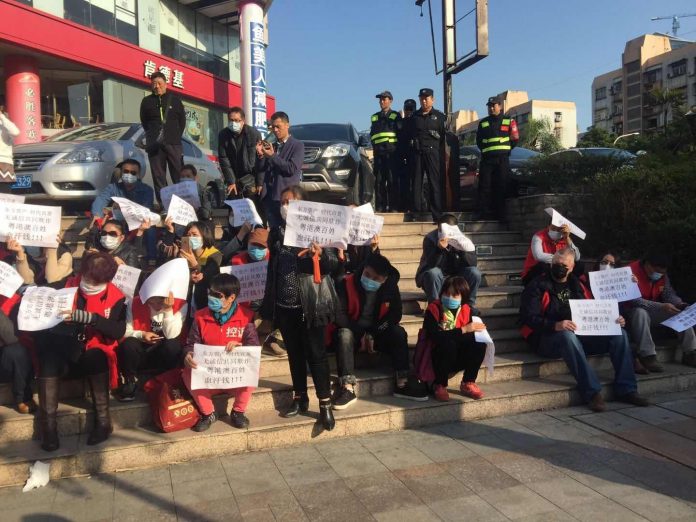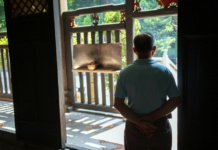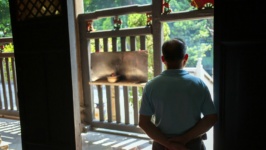
Macau (MNA) – Around 100 investors from Macau and Hong Kong are still waiting to recover money invested in a shopping and residential project in Zhuhai, despite several public protests and court lawsuits in Mainland China.
The project named Zhuhai Times Square in Yingbin Road near the Gongbei Border was initially lauded to become the tallest building in the area.
Chinese media have reported that the original developer of the project in question, Zhuhai Jinshan Real Estate Co., Ltd. have actually obtained a land permit for the development as early as 1991, with constructions starting the following year, but having stopped almost immediately.
The project then suffered several re-starts and suspensions until 2012 when a company named Zhuhai Noode Times Real Estate Co. started the pre-sales of units.
The overall plan included a basement, a podium and two skyscrapers, with the 7th to 21st floors of the main skyscraper to become an international five-star hotel, and the floors between 22nd to 50th to be developed as service apartments, while the floors between the 7th to 31st floor of the second skyscraper were designated as rental apartments.
The podium that was to become a 50,000-square metre shopping mall is the place where a couple residing in Macau who spoke to MNA said to have made an investment in 2016, signalling that what seemed like a good investment opportunity at first eventually became a long dragging dispute.
Holiday investment
In May 2016, while spending a holiday in Zhuhai, the couple stumbled into the building. At that time, the developer was holding a sale-floor advertising to possible investors the options available to purchase future shop units and apartments in the Zhuhai Times Square.
According to contract documents that MNA has consulted, the couple entered into a purchase agreement on May 20, 2016 with Zhuhai Noode Times accepting to pay RMB1 million (US$148.96 million/MOP1.20 billion) for a 10.6 square metre shop unit in the complex, which was to be occupied by a future Apple store.

“The company said they had authorisation [from Zhuhai authorities] for the pre-sale. We trusted the government. We did not know it would be so complicated,” Ms. Mok – not her real name – told MNA.
According to the Macau investors, there are allegedly more than 500 investors from Greater China, who purchased shop units in the project’s six commercial floors for an amount of some RMB200 million, with many others having also invested in the buildings’ future apartments. MNA could not, however, confirm the total amount invested in the projects, which remains uncertain.
Contact information of the companies were not retrievable online.
The project also had the backing of two powerful Chinese state-backed companies, China Huarong Asset Management and China Orient Asset Management, with the investors claiming this only contributed to increase the buyers’ confidence.
The couple also had to sign a separate management agreement with Zhuhai Times Department Store Co., Ltd. – a company connected to the project and allegedly responsible for its management – in which the company agreed to manage the shop for 15 years.
The failed investors agreed to pay half of the RMB1 million being therefore entitled to receive RMB55,740 of rent payment per month in the first three years, RMB65,030 in the three years afterwards, and RMB74,320 in the last eight years.
They further claimed that suspicions had already emerged at the time, with a “strange” supplementary RMB150,000 service charge suddenly added to the RMB500,000 the couple paid initially.
The contract also stipulated that rents were to start being provided on October 2016 when the building was initially intended to be finished. However, after missing the deadline, transfer documents show that the first rent was only provided on January 2017 following further negotiations and that they only lasted for a few months.
No information was provided by the company on why the payments were halted.
The total number of investors who purchased shop units and apartments is hard to assess, with the number of shop unit buyers said to be about 450, comprising a total investment of some RMB200 million, and with most investors coming from Mainland China.
While some of the investors decided to take the case to courts in the Mainland, others, including the Mok couple, have agreed to sign an additional contract in which the company admitted to provide monthly rentals higher than the amount previously agreed.
However, after this agreement was reached the company still only provided the payments until July 2017.
Some of the investors who have succeeded in winning their cases in court were still said to not have been repaid their initial investment by the company, according to the couple who spoke to MNA.
After this point in time, several of the investors came together and decided to hold protests in Zhuhai at the site of the project.

Although Chinese police authorities initially did not intervene in the protests, they were said to have become more intimidating as time went by, filming protesters, threatening with arrest and in some instances actually detaining some of the investors for a couple of hours, the investors noted.
Chinese media were also present in the initial protests but government pressure was said to have deterred further reporting.
The last protest was said to have been held on February 20 of this year, with investors now planning to hold another one on May 1 at the Hong Kong Office of China Orient – said to be the largest investor in the project – as repression by authorities in the Mainland became more serious.

“One of the reasons why so many people bought apartments was because the name of a large Chinese company was said to have invested in it […]. The shops were invested by China Huarong […]. They used these company names to attract people,” Ms. Mok said.
On November 7, 2018, the former chairman of Huarong – one of the project’s backers – Lai Xiao Min was arrested and charged with ‘corruption, bribery and bigamy’ by the Tianjin Public Prosecutions Office.
Chinese media last year reported that authorities later found that he had been holding about three metric tons of cash stashed at home and a bank account under his mother’s name worth RMB300 million. The bigamy charges were pressed against him for living together with a person “as husband and wife” while still legally married to someone else.
With investors requesting the two state-owned companies for some type of compensation, the companies announced that they had also incurred losses after the project failed, with investors saying they believe the latter’s involvement is one of the reasons for the case remaining unresolved.
Petitions from the investors were delivered to Zhuhai authorities, with a first meeting held in October 2017 and about 30 more having been held afterwards, with officials “always promising to help” to resolve the issue, Ms. Mok added.
A letter signed by the investor group was also sent to the Chinese central government anti-corruption authorities in Guangdong asking for an investigation but to no avail.
“The government does not want us to have protests, that’s all they are concerned about,” Ms. Mok said.
The company has stopped communicating with investors and moved its office from the initial location where contracts were signed at the Yindu Hotel building in Zhuhai to an undisclosed location.
Several investors have sought to file lawsuits, either individually or in groups, against the company, but some opted to refrain from doing so since they would not be able to hold protests after court proceedings began.
The couple interviewed by MNA was to take part in one of the class action lawsuits in the Mainland but having been provided with only two days to obtain all information on the deal and rental transfers, was unable to join a group that would take the company to court this month.
MNA repeatedly tried to contact other investors in the project but most were unwilling to make comments.

*Written by Nelson Moura with Jane Wong, Wong Yi Wei and Victoria Man





















